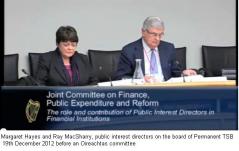Savita Halappanavar’s Husband to receive draft report on good Friday
Feedback from Praveen can be included in final report on ’abortion refusal’ case
Minister for Health James Reilly said the draft of the Health Service Executive’s clinical review into the death of Savita Halappanavar will be personally handed to her husband Praveen tomorrow.
The husband of late Indian dentist Savita Halappanavar will be able to make changes to an official report into her medical care, it was confirmed.
Minister for Health James Reilly said the draft of the Health Service Executive’s (HSE) clinical review will be personally handed to Praveen Halappanavar tomorrow.
He stressed this was not the final version, as Mr Halappanavar – who has so far refused to co-operate with the inquiry – may want to contribute to the report before its publication.
“It would be allow him and his advisers time to examine the report,” said Dr Reilly, who has not seen the draft version.
“There will be an invitation offered to him to attend to meet the chairman and then to make any observations he may wish to make, which could be incorporated into the report.”
Dr Reilly said any adjustments would be made before the final report is brought before Cabinet.
Three inquiries were launched into the death of M/s Halappanavar on October 28th atUniversity Hospital Galway.
She was 17 weeks pregnant when she was admitted to the hospital a week earlier, but suffered a miscarriage and subsequently died of septicaemia.
Her husband claims doctors refused to carry out an abortion as a foetal heartbeat was present.
The HSE inquiry chairman, Prof Sir Sabaratnam Arulkumaran, head of obstetrics and gynaecology at St George’s Hospital, University of London, was granted access to all relevant staff and personnel files and records.
The long-awaited report had originally been promised before the end of February, when a leaked draft copy claimed blood tests from the day she was admitted were not followed up on.
It also found doctors did not respond immediately to calls to attend to her because they were too busy, and it warns that abortion on medical grounds was not considered early enough in her care.
The Health Information and Quality Authority is also investigating Ms Halappanavar’s death, while an inquest by coroner Ciaran MacLoughlin in Galway will be held next month.
Here are RTÉ top ten earners with Ryan Tubridy the highest paid


Ryan Tubridy was the highest paid presenter in RTÉ for 2011 with total earnings of €723,000, up 12% on 2010.
However, in his latest contract, his fees have been reduced by 31% to €495,000.
RTÉ has released figures for its top ten earners for 2010 and 2011
The broadcaster has also revealed details of its latest contract agreements for the first time.
The second highest paid broadcaster in 2011 was Pat Kenny on €630,000. His latest contract is up for renewal this year.
Marian Finucane was paid €492,000 in 2011 and her fees have nearly halved to €295,000 in her new deal.
Joe Duffy was paid €378,000 in 2011, reduced by 20% to €300,000 in his latest contract.
RTÉ says it has reached its objective of cutting presenter pay by at least 30% since 2008. It also says it has agreed increased levels of annual broadcast output with a range of presenters.
Miriam O’Callaghan received €307,000 in 2011, dropping to €211,000 in her latest contract.
Brendan O’Connor was paid €228,500 in 2011, reduced to €158,000 in his latest agreement.
Derek Mooney was the seventh highest paid in 2011 on €220,000.
Broadcaster Sean O’Rourke was paid nearly €209,000 in 2011.
George Hamilton received nearly €203,000 that year, dropping to €168,000 in his new contract.
Bryan Dobson was paid just under €198,000 in 2011.
Mr Mooney, Mr O’Rourke and Mr Dobson are employees rather than contractors so new contract fees are not applicable to them. Their figures also include pension contributions.
Money Village told by the Central Bank to cease some services


MONEY VILLAGE ”DISAPPOINTED” AT CENTRAL BANK’S STATEMENT
A company which provides services to distressed borrowers has been directed to cease part of its activities by the Central Bank.
Dublin-based Money Village deals with the creditors of consumers, including utility companies and financial institutions.
The clients paid money to the firm and the company negotiated and paid customers’ lenders.
Today the Central Bank said the debt management firm was “not authorised or regulated” by the bank but has been providing some payment services which require authorisation.
The Central Bank stressed that clients’ funds were not at risk.
It said it had been in “private negotiations” with the Central Bank since 2010 about ensuring there was regulation for the sector.
Money Village said it had worked closely with the bank and had “co-operated” in every way in an effort to reach agreement.
The company’s chief executive Eugene McDarby said that in the absence of regulation it had worked within British guidelines.
“The Central Bank statement only refers to one aspect of our services and we intend to resolve this issue se we can continue to offer people who are in personal debt in Ireland a service that is needed,” he added.
”Money Village Limited is fully viable and can meet all its financial obligations as proven to the Central Bank. Our legal team is now trying to resolve the matter with the Central Bank as swiftly as possible and we are confident that they will do so,” Mr McDarby added.
Ray MacSharry and Margaret Hayes not seeking re-election at PTSB’s AGM in May


The two Irish Permanent TSB’s public interest directors will not be seeking re-election in May at the AGM
The Department of Finance has said that it is considering its “next steps” following the decision of Mr MacSharry and Ms Hayes to step down.
Allied Irish Banks to consider writing off mortgage debts


An AIB chief has said the bank can do deals with more struggling mortgage holders this year than the State has proposed.
And the bailed-out lender would consider mortgage debt writedowns in selected cases, chief executive David Duffy said.
The bank, which has received more than €20bn from taxpayers, said 9.1pc of its residential mortgage book and 17.7pc of its buy-to-let accounts are in arrears of more than three months.
The Central Bank wants lenders to have come up with solutions for 20pc of those in arrears by July, 30pc by the end of September and 50pc by the end of the year.
At the release of the bank’s annual results yesterday, Mr Duffy said it intended to do better than the targets.
“We are confident that we will meet or exceed the Central Bank restructuring targets,” Mr Duffy said.
He reiterated that they wanted to keep people in their homes “wherever possible”.
“That implies that they would be co-operating with us and we have been making significant efforts to reach out to customers to make contact,” Mr Duffy said.
Mr Duffy said 84pc of the bank’s residential mortgage book are fully performing, while 66pc of its buy-to-lets are performing.
And he said deals had been offered to 3,000 distressed mortgage customers in the last three months, including more than 1,400 split loans and 1,700 other restructurings including mortgage-to-rent and term extensions. Split mortgages allows for part of the loan to be ‘parked’.
In addition, during January and February, 5,000 customers managed to pull themselves out of arrears through their own efforts or working with the bank.
33% of children ‘eat crisps daily’ a study finds


A third of children eat crisps every day, with almost two-thirds regularly consuming them as a snack, according to a UK report.
Just over half (58%) of eight to 15-year-olds eat healthy snacks such asfruit, vegetables, seeds or rice cakes compared with 89% who choose “standard” snacks including crisps, biscuits, confectionery and cakes, the YouGov SixthSense study found.
And confectionery as a whole is more popular than fruit, with 63% of children eating it as a snack compared with 54% opting for the latter.
Almost seven in 10 children snack at least once a day, with 16% doing so twice a day or more.
Fruit is the post popular snack among British adults (51%), followed by crisps (43%), sweet or chocolate biscuits (40%), chocolate bars (36%) and other chocolate confectionery (27%).
The study found 46% of male crisp eaters say they eat them because they are hungry, while 36% of women say they eat them to satisfy cravings.
Only 14% of adults consider their children to be slightly overweight and just 1% very overweight, while 2% of eight to 15-year-olds are on a diet.
YouGov SixthSense research director James McCoy said: “Anyone concerned about childhood obesity in Britain will likely find this report alarming. While it’s encouraging that fruit rates highly as a snack choice for children, they are still eating far more crisps and confectionery products.
“With a third of eight to 15-year-olds eating crisps every single day it’s clear that more needs to be done to make healthier snack options more appealing to children.”
YouGov surveyed 2,100 adults between January 23-26 and 502 children aged eight to 15 between January 18-24.
How to reuse several old hard disks and set up a Storage Space in Windows 8
Mirroring and parity options to protect yourself from drive failure
We explain how to set up Storage Space in Windows 8
Our Helproom Editor explains how to reuse old hard drives and create a Storage Space – combining multiple disks so they appear to be a single drive.
QUESTION I’ve recently upgraded to Windows 8 and I want to make use of some old hard drives by creating a Storage Space. I’m confused about which mode I should use. Alternatively, should I forget about Storage Spaces and use the Intel Raid on my motherboard?
HELPROOM ANSWER Setting up Storage Spaces can be a good way to combine multiple disks so they appear as a single logical drive. It can also give you some mirroring and parity options to protect yourself from drive failure. Storage Spaces are relatively easy to set up in Windows 8, and you can add to or replace the drives in your setup later on.
Storage Spaces do have disadvantages, however. Firstly, you’ll need to be running Windows 8 to access the drive. If you ever run another OS, such as Windows 7 or a Linux OS, your data will be inaccessible. The feature can also cause problems during troubleshooting if your system becomes unable to boot and you need to access the data on the Storage Space.
You may be tempted to use the parity mode option within Storage Spaces to maximise capacity while retaining the ability to survive disk failure. However, this results in a large and very noticeable decrease in performance, especially when writing files. This may not matter too much if you’re using the Storage Space to hold media files (it will be fast enough for playback), but if you ever need to copy large volumes of data you should prepare for a long wait.
The mirroring modes can also protect your data should one of the disks fail, and offer faster performance, but they provide less usable disk space.
The Intel Raid on your motherboard doesn’t require the same level of support from the OS because it uses the board’s firmware to create the disk array. However, it doesn’t offer the same options as Storage Spaces, and is instead based on traditional Raid setups. You can’t add drives to expand the size of your array while it is in use either.
Another possible problem could arise should you need to move your Windows installation to a new motherboard, since it will need to support the same Raid options. So, should your motherboard fail, you stand to lose data if you can’t move over your disks to the new system.
In general, for home users who want to protect their data personal backup is a better option than a redundant disk setup that won’t protect you from accidentally deleting or overwriting files. In any case, it’s important to back up data in a format that remains accessible if your PC fails.



No comments:
Post a Comment